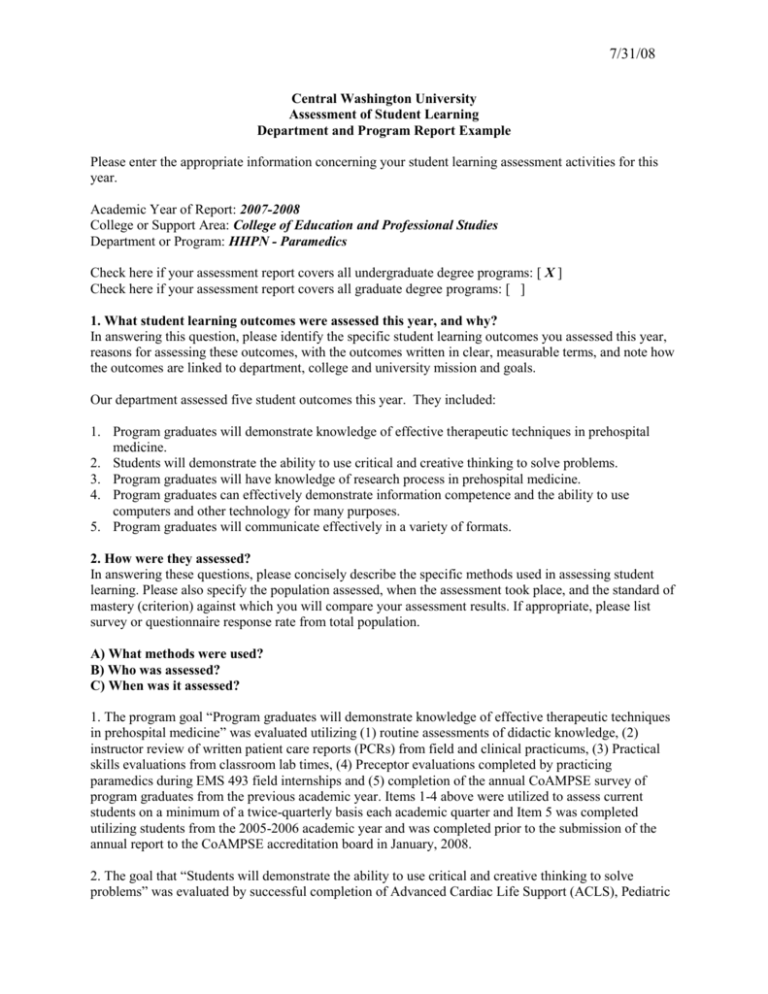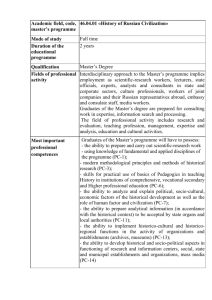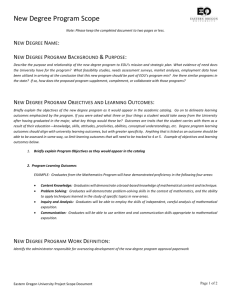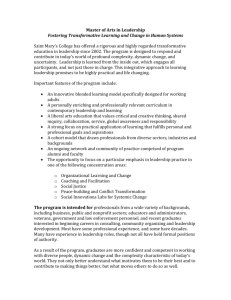Program Review and Assessment - Central Washington University
advertisement

7/31/08 Central Washington University Assessment of Student Learning Department and Program Report Example Please enter the appropriate information concerning your student learning assessment activities for this year. Academic Year of Report: 2007-2008 College or Support Area: College of Education and Professional Studies Department or Program: HHPN - Paramedics Check here if your assessment report covers all undergraduate degree programs: [ X ] Check here if your assessment report covers all graduate degree programs: [ ] 1. What student learning outcomes were assessed this year, and why? In answering this question, please identify the specific student learning outcomes you assessed this year, reasons for assessing these outcomes, with the outcomes written in clear, measurable terms, and note how the outcomes are linked to department, college and university mission and goals. Our department assessed five student outcomes this year. They included: 1. Program graduates will demonstrate knowledge of effective therapeutic techniques in prehospital medicine. 2. Students will demonstrate the ability to use critical and creative thinking to solve problems. 3. Program graduates will have knowledge of research process in prehospital medicine. 4. Program graduates can effectively demonstrate information competence and the ability to use computers and other technology for many purposes. 5. Program graduates will communicate effectively in a variety of formats. 2. How were they assessed? In answering these questions, please concisely describe the specific methods used in assessing student learning. Please also specify the population assessed, when the assessment took place, and the standard of mastery (criterion) against which you will compare your assessment results. If appropriate, please list survey or questionnaire response rate from total population. A) What methods were used? B) Who was assessed? C) When was it assessed? 1. The program goal “Program graduates will demonstrate knowledge of effective therapeutic techniques in prehospital medicine” was evaluated utilizing (1) routine assessments of didactic knowledge, (2) instructor review of written patient care reports (PCRs) from field and clinical practicums, (3) Practical skills evaluations from classroom lab times, (4) Preceptor evaluations completed by practicing paramedics during EMS 493 field internships and (5) completion of the annual CoAMPSE survey of program graduates from the previous academic year. Items 1-4 above were utilized to assess current students on a minimum of a twice-quarterly basis each academic quarter and Item 5 was completed utilizing students from the 2005-2006 academic year and was completed prior to the submission of the annual report to the CoAMPSE accreditation board in January, 2008. 2. The goal that “Students will demonstrate the ability to use critical and creative thinking to solve problems” was evaluated by successful completion of Advanced Cardiac Life Support (ACLS), Pediatric 7/31/08 Advanced Life Support (PALS), Prehospital Trauma Life Support (PHTLS) and National Registry of Emergency Medical Techinicians – Paramedics (NREMT-P) skills stations, as well as satisfactory preceptor evaluations and surveys of past program graduates. Current students all took and passed the PHTLS course in the fall, the ACLS course in the winter, and the PALS course in the spring. All current students also passed all their practical skills evaluations during their NREMT-P practical testing at the end of June. 3. The goal that “Program graduates will have knowledge of research process in prehospital medicine” was not completed this year. Our intent had been to begin the process of conducting an annual programwide research project concluding with a professional manuscript and poster presentation by the entire cohort, however due to limited faculty staffing and program director transition this past year this goal was never realized. 4. The goal of “Program graduates can effectively demonstrate information competence and the ability to use computers and other technology for many purposes” was measured by students being able to (1) Effectively demonstrate competence of computer based Patient Care Reports (PCRs) and skills tracking program (FISDAP), (2) being able to write clear and concise PCRs, (3) and completion of the annual CoAMPSE survey of both past graduates and their current employers. PCRs were evaluated weekly throughout the academic year by the faculty, and the annual surveys of both graduates and employers were completed in January, 2008. 5. The goal of “Program graduates will communicate effectively in a variety of formats” was assessed by students (1) Demonstrating the ability to manage critical medical situations in both lab and field, (2) Field and clinical preceptor evaluations, (3) successful completion of quarterly skills lab classes, and (4) completion of the annual CoAMPSE survey of both past graduates and their current employers. Items 1-2 were evaluated weekly, and Item 3 was evaluated quarterly. Annual surveys of both graduates and employers were completed in January, 2008. 3. What was learned? In answering this question, please report results in specific qualitative or quantitative terms, with the results linked to the outcomes you assessed, and compared to the standard of mastery (criterion) you noted above. Please also include a concise interpretation or analysis of the results. 1. Program graduates will demonstrate knowledge of effective therapeutic techniques in prehospital medicine. All students successfully passed all required coursework with satisfactory grades. Overall students successfully demonstrated entry-level or higher knowledge levels as paramedics. Annual surveys indicated that most graduates who had been employed for one year and their employers felt CWU paramedics had on average a higher knowledge basis than students from other paramedic programs. 2. Students will demonstrate the ability to use critical and creative thinking to solve problems. All students successfully passed PHTLS, ACLS, PALS and the NREMT-P practical exams. All students also received a minimum of 15 evaluations each by field preceptors (practicing paramedics) rating them as “competent” or higher. Annual surveys of employers also indicate that CWU graduates demonstrate proper critical thinking skills. 3. Program graduates will have knowledge of research process in prehospital medicine. 7/31/08 Not completed or accessed this year. See above. 4. Program graduates can effectively demonstrate information competence and the ability to use computers and other technology for many purposes. Students were able to demonstrate proper usage of prehospital technologies such as defibrillators, as well as all students routinely maintained timely completion of FISDAP data entry per program guidelines and PCRs met established program criteria. Annual surveys also showed a high degree of satisfaction with ability to utilize technology. 5. Program graduates will communicate effectively in a variety of formats. All students successfully passed practical skills labs based on established criteria (ACLS, PALS, PHTLS, NREMT-P). All students also successfully pass practical skills lab classes quarterly. All students also achieved 80% or better “competent” rating from preceptors (Spring). Annual surveys show high degree of satisfaction with graduate’s communication skills. 4. What will the department or program do as a result of that information? In answering this question, please note specific changes to your program as they affect student learning, and as they are related to results from the assessment process. If no changes are planned, please describe why no changes are needed. In addition, how will the department report the results and changes to internal and external constituents? 1. Program graduates will demonstrate knowledge of effective therapeutic techniques in prehospital medicine. There are no significant changes planned for this particular assessment at this time. Currently students are all demonstrating competency in therapeutic techniques and passing all required certification exams as needed for both program completion and state and national certification. 2. Students will demonstrate the ability to use critical and creative thinking to solve problems. Based upon student feedback and instructor observations we will be looking to add more dedicated lab hours to fall quarter, to allow for additional scenario based labs where students can work individually and in small groups to manage simulated prehospital emergency cases. Both student and faculty felt the increased lab hours this past winter and spring (EMS 398) enhanced the students learning experiences in the classroom setting and helped them to develop their critical thinking skills, which were then evaluated on actual prehospital cases by their field preceptors during their practicums (EMS 493). 3. Program graduates will have knowledge of research process in prehospital medicine. Our desire is still to incorporate a general appreciation of research methods into the curriculum, however since we are once again transitioning program faculty and the directorship position, the exact timeframe for implementation of this goal is yet to be determined. 4. Program graduates can effectively demonstrate information competence and the ability to use computers and other technology for many purposes. 7/31/08 Students demonstrated effective use of technologies throughout the progression of the academic year. The primary are for improvement noted by faculty was the need for more timely data entry of student PCRs into their web-based internship report tracking system (FISDAP). Students had up to 7 days to enter data and then turn in their PCRs to faculty, which resulted in delays in getting feedback to students. Since most future employers of our graduates require all paperwork to be completed prior to the end of shift, we are changing the data entry requirement to 72 hours to better reflect the need for prompt PCR completion and data entry. 5. Program graduates will communicate effectively in a variety of formats. No plans to change assessment of students abilities to communicate effectively at this time. The completion of Team Leader Evaluations by actual field preceptors, along with the skills labs with instructors and the required completion of ACLS, PALS, PHTLS and NREMT-P Practicals all assess the student’s abilities to adequately communicate in the prehospital setting under a variety of conditions and stresses. 5. What did the department or program do in response to the feedback from last year's assessment report? In answering this question, please describe any changes that have been made to improve student learning based on previous assessment results. Please also discuss any changes you have made to your assessment plan or assessment methods. No assessment completed from 2006-2007. 6. Questions or suggestions concerning Assessment of Student Learning at Central Washington University: N/A






